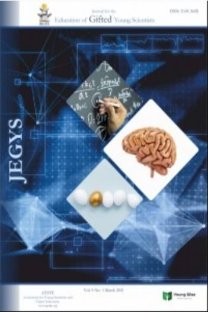Empowerment Gifted Young Scientists (GYS) in Millennial Generation : Impact of Quality Improvement in Education of Gender Perspective
Gifted Young Scientists (GYS), Quality Improvement of Education, STEM, FGD,
___
- Abdurrahman, A., Nurulsari, N., Maulina, H., & Ariyani, F. (2019). Design and Validation of Inquiry-based STEM Learning Strategy as a Powerful Alternative Solution to Facilitate Gifted Students Facing 21st Century Challenging To cite this article : Journal for the Education of Gifted Young, 7(March), 33–56.
- Abdurrahman, Saregar, A., & Umam, R. (2018). Assessment Toward The Quantum Physics Concept Mastery Of The Prospective Physics Teachers. Jurnal Pendidikan IPA Indonesia, 7(1), 34–40.
- Andini, M., & Yunianta, T. N. H. (2018). The Development of Borad game “The Adventure Of Algebra” in The Senior High School Mathematics Learning. Al-Jabar : Jurnal Pendidikan Matematika, 9(2), 95–109.
- Cetin, O., & Tortop, H. S. (2018). The Role of Image Analysis in Revealing Family Experiences and Future Drafting of Gifted Children. Journal of Gifted Education and Creativity, 5(1), 108–129.
- Diani, R., Irwandani, I., Al-Hijrah, A.-H., Yetri, Y., Fujiani, D., Hartati, N. S., & Umam, R. (2019). Physics Learning through Active Learning Based Interactive Conceptual Instructions (ALBICI) to Improve Critical Thinking Ability. Jurnal Penelitian Dan Pembelajaran IPA, 5(1), 48.
- Gulgor, F., & Tortop, H. S. (2018). Marriage Adaptation : A Glance at Gifteds. Journal of Gifted Education and Creativity, 20185(2), 45–58.Hartinah, S., Sholikhakh, R. A., Umam, R., Syazali, M., Andriani, S., Mujib, … Lestari, F. (2019). Application Auto-play Media Studio (AMS) 8 for Learning Me-dia of Logaritm Function. International Journal of Engineering & Technology, 8(2), In Press.
- Kasayanond, A., Umam, R., & Jermsittiparsert, K. (2019). Environmental Sustainability and its Growth in Malaysia by Elaborating the Green Economy and Environmental Efficiency. International Journal of Energy Economics and Policy, 9(5), 465–473.
- Kusumawati, R., & Nayazik, A. (2018). Developing Mathematics Learning Strategy Module Based on Journal Review. Al-Jabar : Jurnal Pendidikan Matematika, 9(2), 111–120.
- Lestari, F., Saryantono, B., Syazali, M., Saregar, A., Jauhariyah, D., & Umam, R. (2019). Cooperative Learning Application with the Method of Network Tree Concept Map : Based on Japanese Learning System Approach. Journal for the Education of Gifted Young Scientists, 7(1), 15–32.
- Maskur, R., Syazali, M., & Utami, L. F. (2019). Islamic-Nuanced Calculus Module with Open-Ended Approach in Real Number System Material. Journal of Physics: Conference Series, 1155(1).
- Nugroho, A. A., Putra, R. W. Y., Putra, F. G., & Syazali, M. (2017). Pengembangan Blog sebagai Media Pembelajaran Matematika. Al-Jabar : Jurnal Pendidikan Matematika, 8(2), 197–204.
- Putra, F., Nur Kholifah, I. Y., Subali, B., & Rusilowati, A. (2018). 5E-Learning Cycle Strategy: Increasing Conceptual Understanding and Learning Motivation. Jurnal Ilmiah Pendidikan Fisika Al-Biruni, 7(2), 171.
- Rahman, B., Abdurrahman, A., Kadaryanto, B., & Rusminto, N. E. (2015). Teacher-based scaffolding as a teacher professional development program in Indonesia. Australian Journal of Teacher Education, 40(11), 66–78.
- Ramadhani, R., Umam, R., Abdurrahman, A., & Syazali, M. (2019). The Effect Of Flipped-Problem Based Learning Model Integrated With LMS-Google Classroom For Senior High School Students. Journal for the Education of Gifted Young, 7(2), 137 – 158.
- Ratnasari, N., Tadjudin, N., Syazali, M., Mujib, M., & Andriani, S. (2018). Project Based Learning (PjBL) Model on the Mathematical Representation Ability. Tadris: Jurnal Keguruan Dan Ilmu Tarbiyah, 3(1), 47.
- Rufaidah, E., AtIrsyadi, K. A., Saregar, A., & Umam, R. (2018). The Effect of HALAL Label to Increase Domestic and International Tourism : Case Study In Lombok, Indonesia. International Journal of Management and Business Research, 8(4), 29–36.
- Sagala, R., Umam, R., Thahir, A., Saregar, A., & Wardani, I. (2019). The Effectiveness of STEM-Based on GenderDifferences: The Impact of PhysicsConcept Understanding. European Journal of Educational Research, 8(3), 753–763.
- Saregar, A., Latifah, S., & Sari, M. (2016). Efektivitas Model Pembelajaran CUPs: Dampak terhadap Kemampuan Berpikir Tingkat Tinggi Peserta Didik Madrasah Aliyah Mathla’ul Anwar Gisting Lampung. Jurnal Ilmiah Pendidikan Fisika Al-Biruni, 05(2), 233–243.
- Syahrir, S., Syazali, M., Masykur, R., Amrulloh, M. A., Sada, H. J., & Listiani, B. (2018). Calculus Module for Derivative Application Materials with an Islamic Contextual Teaching and Learning Approach. IOP Conference Series: Journal of Physics, 1155. https://doi.org/10.1088/1742-6596/1155/1/012079
- Syazali, M., Putra, F. G., Rinaldi, A., Utami, L. F., Widayanti, Jermsittiparsert, K., & Umam, R. (2019). Partial correlation analysis using multiple linear regression: Impact on business environment of digital marketing interest in the era of industrial revolution 4.0. Management Science Letters, 9, In Press. https://doi.org/10.5267/j.msl.2019.6.005
- Syazali, M., Sari, N. R., Sukawati, S., Sari, W. R., Pertiwi, S. D., Putra, A., & Putra, F. G. (2019). Islamic-Nuanced Linear Algebra Module with Problem-Based Learning Approach for Linear Equation System Material. Journal of Physics: Conference Series, 1155(1). https://doi.org/10.1088/1742-6596/1155/1/012097
- Yilmaz, B., & Tortop, H. S. (2018). Values Education and Gifted. Journal of Gifted Education and Creativity, 5(1), 10–27.
- Yuniasti, A., & Wulandari, R. (2018). The Relationship Between Verbal Ability and Critical Thinking Skill: The Implementation of Susan Loucks Horsley Model. Jurnal Ilmiah Pendidikan Fisika Al-BiRuNi, 7(1), 89–97.
- Başlangıç: 2013
- Yayıncı: Genç Bilge Yayıncılık
Syahfitri PURNAMA, Farikah FARİKAH, Burhan Eko PURWANTO, Sri WARDHANİ, İdham KHOLİD, Syamsul HUDA, Watcharin JOEMSİTTİPRASERT
Miftakhul Huda HUDA, Abdul Syukur GHAZALİ, Wahyudi SİSWANTO, Muakibatul HASANAH
Fatma SUKMAWATİ, Punaji SETYOSARİ, Sulton SULTON, Purnomo PURNOMO
Pardimin PARDİMİN, Nyoman ARCANA, Didi SUPRİADİ
Ahsan ABDULFATTAH, Supahar SUPAHAR
Wuttikorn İNJANA, Ratchadakorn Phonpakdee, Pakkapong POUNGSUK, Sirirat PETSANGSRİ
